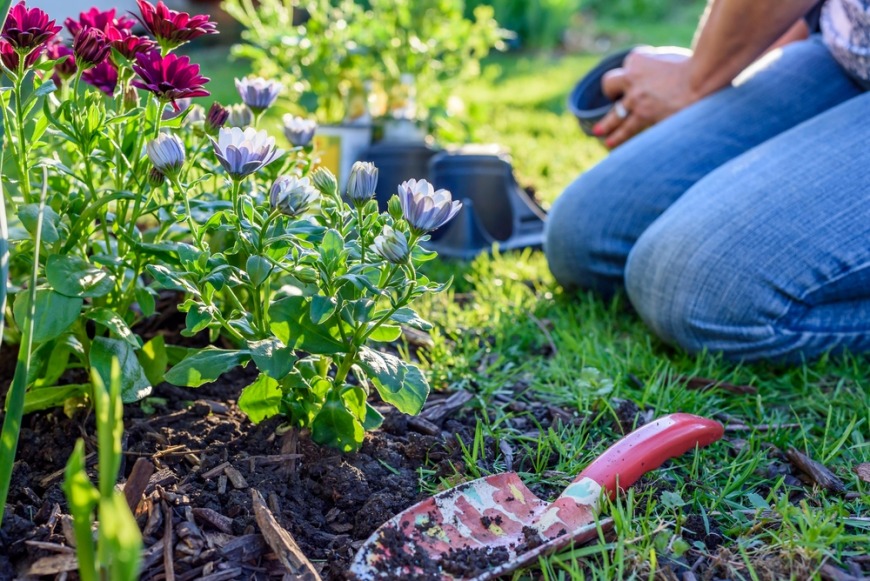No time or room to make your own compost? Here's how to choose what's best for you from the garden centre
24 February 2019
| Last updated on 19 January 2020
All credits: PA
Make the most of the weather and get into your garden... Sow, plant, mulch and dig! But what compost is best for each job?
To keep things simple, be aware that there are basically two types of compost: soil-less and soil-based.
Soil-less compost is are types that are ideal for quick-growing crops or annuals in pots, where the plants are only going to be in the pot or container for a year. These composts are mainly made up of organic matter such as bark, coir, green waste, paper, leafmould and sawdust, with added nutrients and water-retaining agents.
SEE ALSO: The importance of TNR in Dubai and why it's done
Soil-based compost are better for planting trees or growing permanent specimens in containers, such as shrubs or perennials. They are sold under the John Innes formula and are made from a mixture of loam, sand or grit and peat, with plant foods added.
Each John Innes number contains progressively more feed. John Innes No 1 is good for pricking out or potting up young seedlings; No 2 has more nutrients and is used when potting up small plants and vegetable plants in containers; No. 3 is ideal for mature plants, permanent plantings in pots and when planting trees and shrubs.
Where to buy compost in Dubai?
Before we delve into the different types of compost that are best for each job in your garden - here's where you can find shop-bought compost in Dubai.
- Dubai Garden Centre
- Acacia Garden Centre
- Brook Plants and Landscaping LLC
- Orchid Garden Centre
- Royal Garden Centre
- Sultan Garden Centre
- The Garden Centre
- Green Glades Plant Nursery
- Gover Garden Centre
In Warsan, behind International City, there's several nurseries and garden centres. A trip up here is definitely worth it if you're wishing to purchase a lot of items - you can save incredible amounts of money compared to shopping in the centres closer to the city.
Here’s what you need to know about the different styles of compost available…

Multi-purpose compost
This is the most versatile compost, which can be used to dig in and enrich beds and borders, as well as plant up containers. There are many which contain blends of ingredients, including plant foods which can feed your plants throughout the season, water-retaining properties and added John Innes.
Peat-free compost
Many gardeners are opposed to composts containing peat because they continue to deplete British peat bogs, although historically, peat has been used in compost because it’s good at holding water and retaining nutrients.
Some gardeners argue that plants grow better in peat-based products, but others insist that if you adapt to the properties of peat-free, you should be fine.
SEE ALSO: Did you know? The Burj Al Arab has a sea turtle hospital
Peat-free composts generally retain water better, which is great in hot summers, but can lead to rotting plants in wet winters. So add grit to your peat-free compost before planting to enhance drainage and water your plants little and often during the summer, rather than completely soaking them once a day.
Check the wording on the bag – if it doesn’t say ‘peat-free’ then it generally isn’t. Marketeers may use wording such as ‘environmentally friendly’ and ‘organic’, but that doesn’t necessarily mean it’s peat-free.
Ericaceous compost
Acid-loving plants including camellia, azalea, rhododendron and heather are best planted using ericaceous compost. If you are planting them in a flower bed that naturally has alkaline soil, they are likely to suffer, as sooner or later the ericaceous compost will lose its efficacy and the original soil make-up will seep through.
It’s often better to choose plants that will like your existing soil, rather than trying to adapt unsuitable plants using specific composts. If you love azaleas but don’t have acid soil, consider planting them in pots using ericaceous compost.

Seed and potting compost
Seed compost has the lowest amount of nutrients, which encourages the best germination and growth of tiny roots. A seed compost is much more in tune with the needs of a developing seed than a general multi-purpose compost.
Low nutrient levels don’t affect the plant growth because individual seeds already contain a store of food to feed the developing plants.
Spent mushroom compost
This is generally cheaper than other composts and is often used as a soil conditioner or to mulch a bed. It is called ‘spent’ because it is compost left over from mushroom farming.
It has a high lime content so is ideal for the vegetable garden as veg crops, including brassicas, grow best when the soil is not acid. However, don’t place it near acid-loving plants like azaleas and rhododendron.
SEE ALSO: How you can embrace a plastic free life in Dubai
The RHS advises gardeners to use it in moderation, alternating with well-rotted manure or garden compost, which should help balance the alkaline nature of the mushroom compost. It’s also not suitable for fruit crops, which need a more neutral or acid soil.
Animal manure
Animal manure is a fantastic soil conditioner, but it must be well rotted before adding to the soil, or the concentration of nitrogen will scorch young plants.
If you are offered fresh manure, you’ll need to create a space to rot it down for at least six months before spreading it across the soil in spring, a few weeks before planting. Break up any lumps by raking it and mix in some topsoil.




.png?itok=HBSyMDok)









































































.png)


























.png?itok=0fOAXkOm)

























.png?itok=EH_x0Pha)
